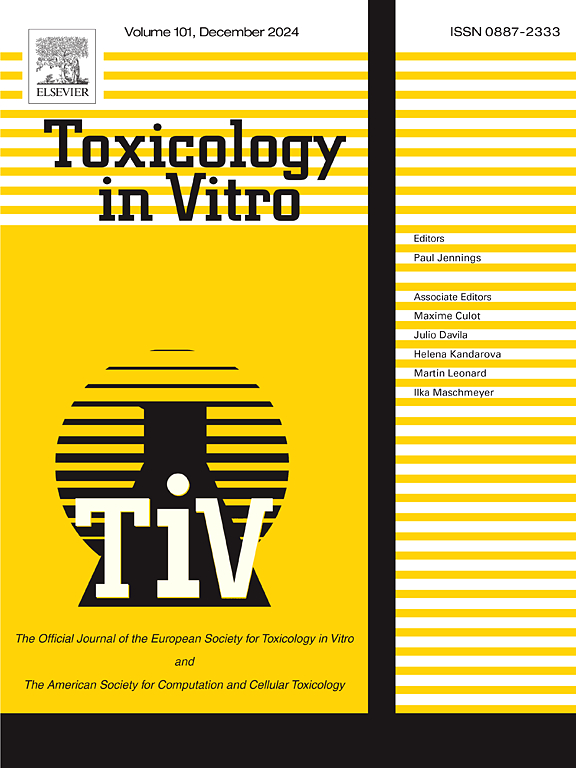β-Arbutin and cisplatin: A combined approach to modulating apoptosis, cell viability, and migration in bladder cancer cells
IF 2.7
3区 医学
Q3 TOXICOLOGY
引用次数: 0
Abstract
One of the preferred treatments for bladder cancer, one of the most common cancers worldwide, is cisplatin-based chemotherapy. Since most tumor cells show cisplatin resistance, it is very important to discover new agents without adverse side effects. β-arbutin, a hydroquinone-β-D-glucopyranoside, has biological properties such as antioxidant, antimicrobial, anti-inflammatory, and anticancer, and is a phytochemical widely used as a skin whitener. In this study, β-arbutin was purified from the animal feed plant Onobrychis buhseana Boiss. (sainfoin). The study aimed to investigate the combined effects of cisplatin, a clinically used chemotherapeutic agent, and β-arbutin on HT-1376 bladder cancer cells for apoptosis, cell viability, and migration. In the study, after HT-1376 bladder cancer cells were cultured, optimum β-arbutin and cisplatin doses were determined on HT-1376 cells using the WST-1 test. To determine the apoptotic and migratory effects, flow cytometry and wound healing assays were performed. In HT-1376 cells, β-Arbutin led to greater apoptotoic and migratory effects when used alone and combined with Cisplatin (p < 0.0001 for apoptotic and migratory effects treated with β-Arbutin alone, p < 0.0001 for apoptotic and migratory effects when combined with Cisplatin). As a result, it can be suggested that β-arbutin may be a good drug candidate for treating bladder cancer.
β-熊果苷和顺铂:调节膀胱癌细胞凋亡、细胞活力和迁移的联合方法。
膀胱癌是世界上最常见的癌症之一,首选的治疗方法之一是基于顺铂的化疗。由于大多数肿瘤细胞表现出顺铂耐药性,因此发现无不良副作用的新药物非常重要。β-熊果苷是一种对苯二酚-β- d -葡萄糖吡喃苷,具有抗氧化、抗菌、抗炎、抗癌等生物学特性,是一种广泛用于皮肤增白剂的植物化学物质。本研究从动物饲料植物褐藓中纯化了β-熊果苷。(红豆草)。本研究旨在探讨顺铂(临床上常用的化疗药物)联合β-熊果苷对HT-1376膀胱癌细胞凋亡、细胞活力和迁移的影响。本研究通过培养HT-1376膀胱癌细胞后,采用WST-1试验确定HT-1376细胞上β-熊果苷和顺铂的最佳剂量。通过流式细胞术和伤口愈合实验来确定细胞凋亡和迁移作用。在HT-1376细胞中,β-熊果苷在单独使用和与顺铂联合使用时可导致更大的凋亡和迁移效应(p
本文章由计算机程序翻译,如有差异,请以英文原文为准。
求助全文
约1分钟内获得全文
求助全文
来源期刊

Toxicology in Vitro
医学-毒理学
CiteScore
6.50
自引率
3.10%
发文量
181
审稿时长
65 days
期刊介绍:
Toxicology in Vitro publishes original research papers and reviews on the application and use of in vitro systems for assessing or predicting the toxic effects of chemicals and elucidating their mechanisms of action. These in vitro techniques include utilizing cell or tissue cultures, isolated cells, tissue slices, subcellular fractions, transgenic cell cultures, and cells from transgenic organisms, as well as in silico modelling. The Journal will focus on investigations that involve the development and validation of new in vitro methods, e.g. for prediction of toxic effects based on traditional and in silico modelling; on the use of methods in high-throughput toxicology and pharmacology; elucidation of mechanisms of toxic action; the application of genomics, transcriptomics and proteomics in toxicology, as well as on comparative studies that characterise the relationship between in vitro and in vivo findings. The Journal strongly encourages the submission of manuscripts that focus on the development of in vitro methods, their practical applications and regulatory use (e.g. in the areas of food components cosmetics, pharmaceuticals, pesticides, and industrial chemicals). Toxicology in Vitro discourages papers that record reporting on toxicological effects from materials, such as plant extracts or herbal medicines, that have not been chemically characterized.
 求助内容:
求助内容: 应助结果提醒方式:
应助结果提醒方式:


